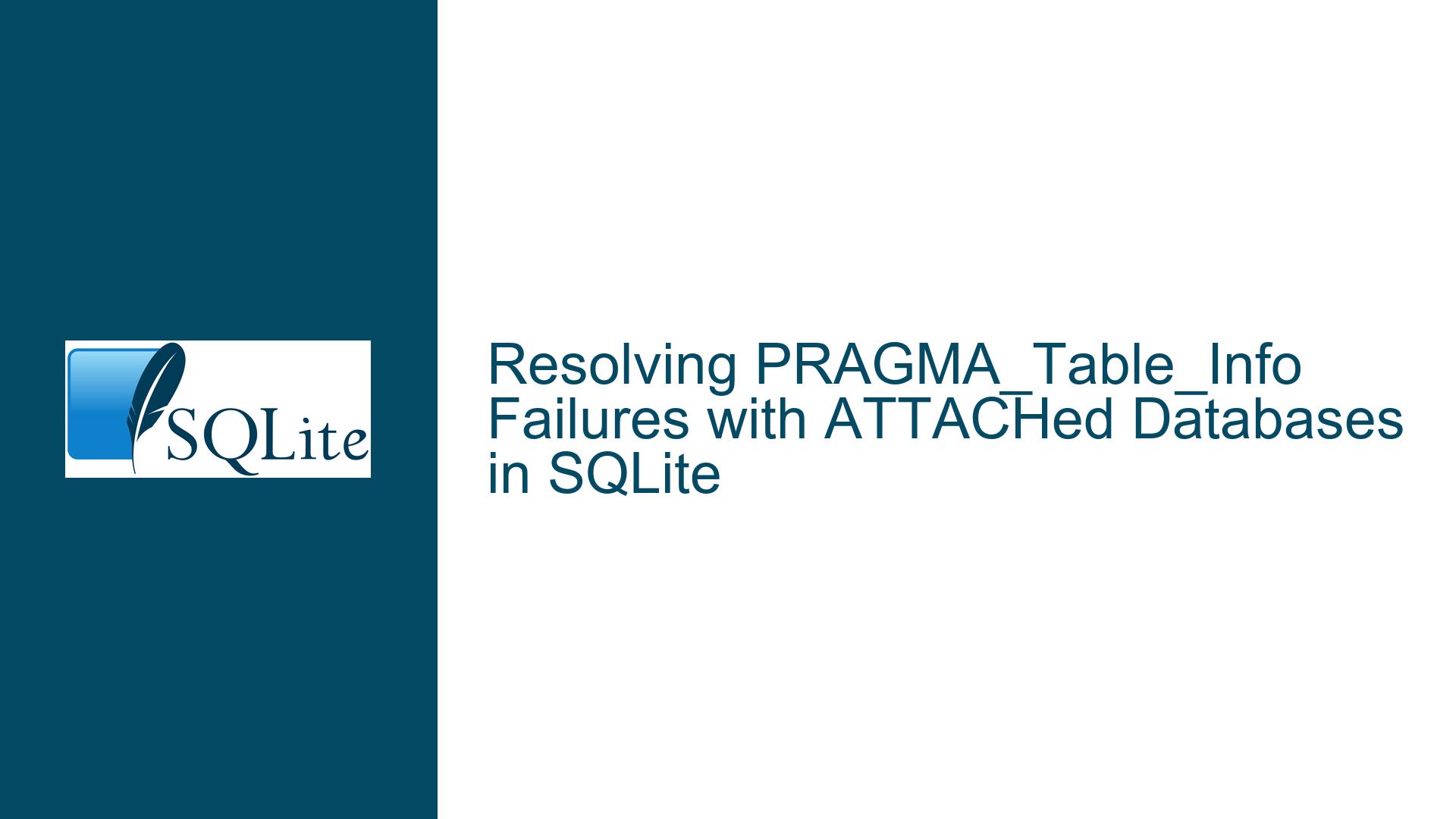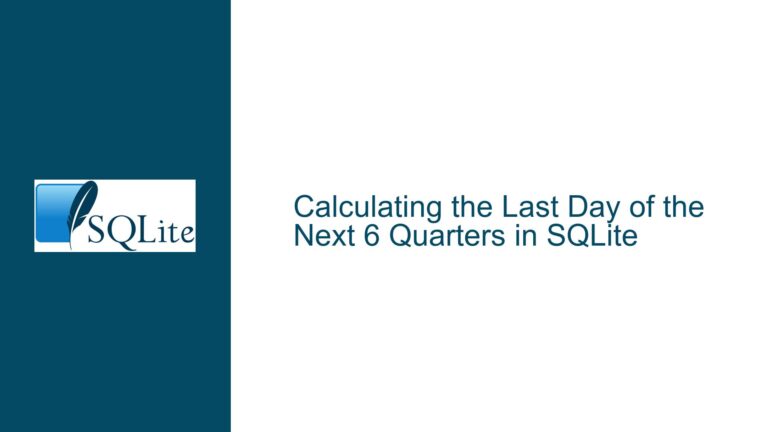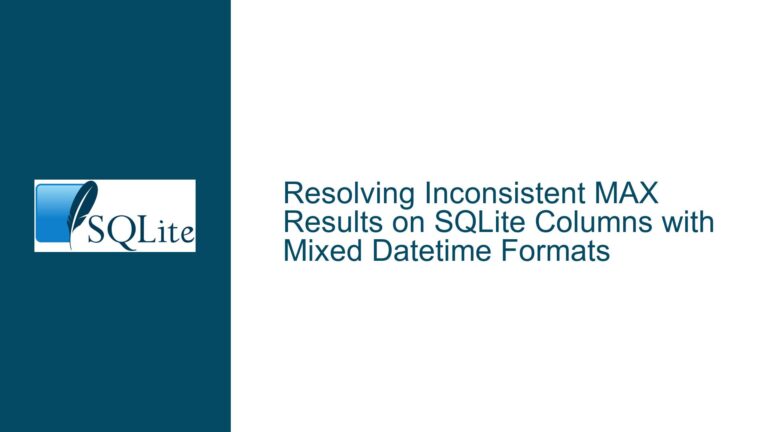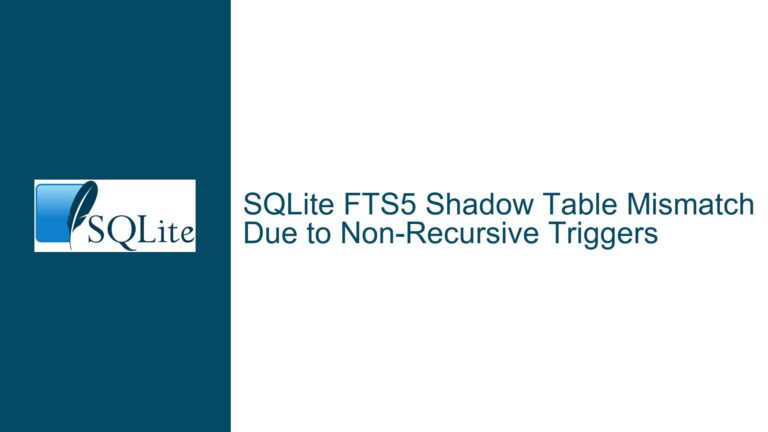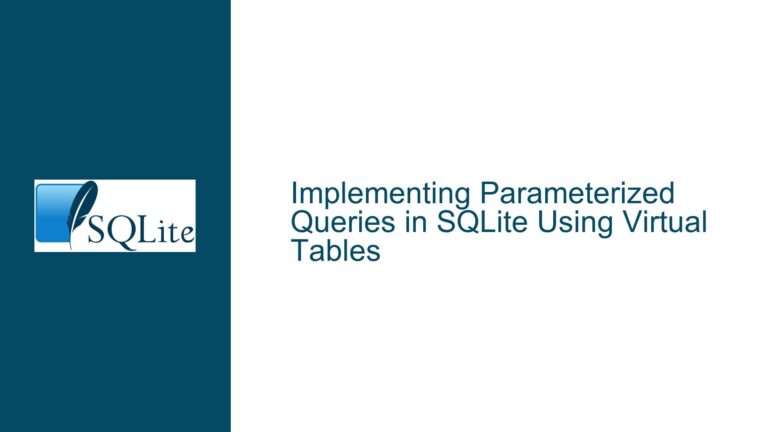Resolving PRAGMA_Table_Info Failures with ATTACHed Databases in SQLite
Understanding PRAGMA_Table_Info Syntax and Schema Resolution Conflicts
Core Problem: Ambiguous Schema References for Eponymous Virtual Tables
The central challenge arises when attempting to execute pragma_table_info against tables in ATTACHed databases. SQLite’s eponymous virtual tables (like pragma_table_info) behave differently from standard tables due to their connection-bound nature. Users expect schema-qualified syntax (e.g., <schema>.pragma_table_info) to target specific databases but encounter errors like "no such table" or "not a function". This stems from SQLite’s resolution mechanism for virtual tables, schema precedence rules, and object name conflicts.
Eponymous virtual tables are not stored in schema catalogs like sqlite_schema but are instead ephemeral objects bound to the database connection. When a user writes <schema>.pragma_table_info, SQLite interprets this as a reference to a physical table named pragma_table_info in the specified schema. Since no such table exists, the query fails. The correct approach requires parameterizing the schema context within the pragma function call rather than qualifying the virtual table name.
Further complications arise when user-defined tables or objects share names with eponymous virtual tables (e.g., creating a table called pragma_table_info). This hijacks the default resolution path, causing SQLite to prioritize the user-defined object over the virtual table. Such scenarios create false negatives where queries appear syntactically valid but return unexpected results or errors.
Schema Qualification Missteps and Object Name Collisions
1. Incorrect Schema Qualification Syntax
A common misconception is that schema prefixes apply directly to pragma functions. For example, main.pragma_table_info('mytable') suggests executing the pragma against the main schema. However, pragma_table_info is not a schema-owned object. Instead, it accepts schema parameters through arguments or WHERE clauses.
2. Name Shadowing by User-Defined Objects
Creating a physical table named pragma_table_info in any schema (e.g., temp or main) overrides the virtual table’s visibility. Queries referencing pragma_table_info will resolve to the user-defined table unless explicitly disambiguated. This leads to type errors (e.g., "not a function") when the pragma’s functional syntax is used against a table.
3. Parameterization Errors in Pragma Functions
Pragma virtual tables accept parameters via two mechanisms:
- Positional arguments in the table-valued function syntax:
pragma_table_info('table', 'schema'). - Filter clauses in the WHERE clause:
SELECT * FROM pragma_table_info WHERE arg='table' AND schema='schema'.
Mixing these approaches or omitting schema parameters causes incomplete data retrieval.
4. Schema Search Order Ambiguity
When no schema is specified, SQLite follows a search order: temp, main, then ATTACHed databases in alphabetical order. Pragma functions lacking explicit schema parameters default to searching the main schema, which may not align with user intent when working with ATTACHed databases.
Correct Parameterization and Conflict Mitigation Strategies
1. Proper Schema and Table Parameterization
To target a specific ATTACHed database, pass the schema name as a parameter to pragma_table_info:
-- Positional arguments
SELECT * FROM pragma_table_info('mytable', 'attached_schema');
-- Named parameters in WHERE clause
SELECT * FROM pragma_table_info
WHERE arg = 'mytable' AND schema = 'attached_schema';
This bypasses schema qualification of the virtual table itself, directing the pragma to operate on the specified schema.
2. Disambiguating Name Conflicts
If a user-defined pragma_table_info table exists, force the virtual table resolution using the eponymous schema placeholder:
-- Explicitly reference the eponymous virtual table
SELECT * FROM eponymous.pragma_table_info('mytable', 'attached_schema');
The eponymous keyword ensures SQLite ignores physical tables and resolves to the virtual table.
3. Validating Schema Existence
Before executing pragmas, verify the ATTACHed schema’s availability:
-- Check if schema exists
SELECT name FROM pragma_database_list WHERE name = 'attached_schema';
If the schema is missing, re-ATTACH the database or adjust the schema parameter.
4. Dynamic SQL Generation for Multi-Schema Environments
When handling multiple schemas programmatically, construct queries with embedded schema parameters:
// C++ example using parameterized schemas
std::string query = "SELECT * FROM pragma_table_info(?, ?)";
sqlite3_stmt *stmt;
sqlite3_prepare_v2(db, query.c_str(), -1, &stmt, nullptr);
sqlite3_bind_text(stmt, 1, "mytable", -1, SQLITE_STATIC);
sqlite3_bind_text(stmt, 2, "attached_schema", -1, SQLITE_STATIC);
This avoids hardcoding schema names and ensures runtime flexibility.
5. Avoiding Object Name Collisions
Adopt naming conventions that prevent clashes with eponymous virtual tables. For example, prefix user-defined tables with application-specific identifiers:
CREATE TABLE app_pragma_table_info (...); -- Instead of 'pragma_table_info'
6. Leveraging Function-Style Syntax for Clarity
Use the function-style invocation of pragmas to emphasize parameter passing over table qualification:
-- Preferred method
SELECT * FROM pragma_table_info('attached_schema.mytable');
-- Equivalent to
SELECT * FROM pragma_table_info('mytable', 'attached_schema');
The schema.table string syntax implicitly sets both parameters.
7. Debugging with PRAGMA_Database_List
Audit ATTACHed databases to confirm their aliases and schemas:
SELECT * FROM pragma_database_list;
-- Output example:
-- seq | name | file
-- 0 | main | /path/to/main.db
-- 1 | temp |
-- 2 | secondary| /path/to/secondary.db
Use the name column values as schema parameters in pragmas.
8. Handling Edge Cases with Temporary Schemas
Temporary schemas (temp) have higher search precedence. If a pragma call omits the schema parameter and a table exists in both temp and main, results may reflect the temp schema unintentionally. Always specify schemas explicitly in multi-environment setups.
9. Utilizing Type Checking and Error Messages
Parse SQLite error messages to detect object type mismatches. For instance, "not a function" indicates that a user-defined table is shadowing the pragma virtual table. React by disambiguating via the eponymous schema or renaming conflicting objects.
10. Cross-Schema Pragma Execution in Views
When creating views that reference pragmas, embed schema parameters statically:
CREATE VIEW main.mytable_info AS
SELECT * FROM pragma_table_info('mytable', 'main');
This ensures the view consistently targets the intended schema, even if default search paths change.
By methodically addressing schema parameterization, avoiding name conflicts, and understanding SQLite’s virtual table resolution mechanics, developers can reliably use pragma_table_info and similar functions across ATTACHed databases. These strategies ensure accurate metadata retrieval and prevent common pitfalls in multi-database environments.
